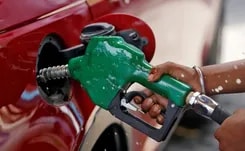Is Filling Nitrogen in Your Tyres a Good Bet?
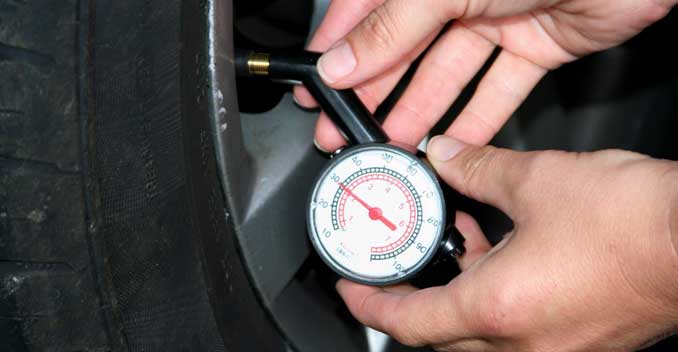
Let's start with some science. Air is 78 percent nitrogen, under 21 percent oxygen, and the rest is water vapour, CO2 and small concentrations of noble gases such as neon and argon. And since all gasses expand when heated and contract when cooled, the pressures in the tyres increase and decrease due to the change in temperature. This is one of the reasons it's recommended that tire pressures be checked on a regular basis.
When it comes to nitrogen, however, there's a different story brewing. Nitrogen is less likely to migrate through tyre rubber than oxygen and this means that your tyre pressure will be stable over a long period of time. If you didn't already know, Indycar and Formula One racers prefer the use of nitrogen rather than air because there's less pressure change as temperatures in the tyres begin to soar.
Also Read: How to Change your Tyre
Another problem with using air is humidity and that inside a tyre can do a lot more damage than you might think. Water, present as a vapour or in its liquid form causes change in pressure and is also responsible for the corrosion of the steel and aluminium rims on the tyre.
How does nitrogen helps in this scenario? Well, filling tyres with pure nitrogen dilutes the concentration of oxygen in the tyre, which then removes water and there is less chance of corrosion in the rims.
Also Read: Monsoon Car Care Tips
Filling nitrogen isn't a tedious process either. The tyre mechanic will deflate all your tyres and fill it to the correct psi (as suggested by the car manufacturer) and that's it. Using nitrogen then, helps tyre pressure to be stable over a longer period of time, however does not do away with the process of checking tyre pressure.
You still need to check the air pressure and keep it at the optimum level. If you think that putting nitrogen in your tyres will improve handling or fuel efficiency, well, not really. However, what it helps in is tyre maintenance. Constant pressure means less wear and longer life for the tyre.
It all comes down to cost then and as we know, filling air is free at most of the gas stations but nitrogen comes at a cost. It costs between Rs. 40-50 per tyre which boils down to a maximum of Rs. 250 counting the spare. So, there's absolutely no harm in trying out something new as it certainly comes with some benefits to its name.
Latest News
 Jaiveer Mehra | Feb 12, 2026Mahindra Eyes Increasing Production Capacity Of ICE & Electric SUVs By Up To 7,000 Units Per Month By Q2 FY2027Carmaker said that currently models such as the Bolero, Bolero Neo and XUV 3XO are being manufactured at peak capacity.1 min read
Jaiveer Mehra | Feb 12, 2026Mahindra Eyes Increasing Production Capacity Of ICE & Electric SUVs By Up To 7,000 Units Per Month By Q2 FY2027Carmaker said that currently models such as the Bolero, Bolero Neo and XUV 3XO are being manufactured at peak capacity.1 min read Carandbike Team | Feb 11, 2026MG Majestor India Launch Today: What To Expect?Essentially an updated version of the MG Gloster, the new Majestor will be positioned as a more premium derivative, taking on rivals like the Toyota Fortuner.3 mins read
Carandbike Team | Feb 11, 2026MG Majestor India Launch Today: What To Expect?Essentially an updated version of the MG Gloster, the new Majestor will be positioned as a more premium derivative, taking on rivals like the Toyota Fortuner.3 mins read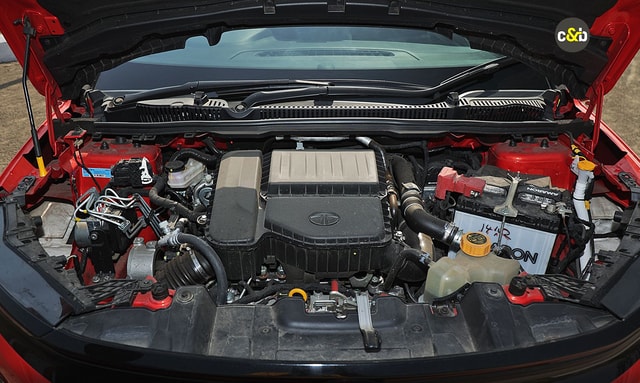 car&bike Team | Feb 12, 2026End Of The Road For Diesel Vehicles? Niti Aayog Pushes For Adoption Of Cleaner FuelsIn its latest report, Niti Aayog has advocated the use of cleaner fuels like CNG while doing a gradual phase out of Diesel technology1 min read
car&bike Team | Feb 12, 2026End Of The Road For Diesel Vehicles? Niti Aayog Pushes For Adoption Of Cleaner FuelsIn its latest report, Niti Aayog has advocated the use of cleaner fuels like CNG while doing a gradual phase out of Diesel technology1 min read Janak Sorap | Feb 11, 2026BMW Motorrad Announces GS Experience 2026 Training ProgramBMW Motorrad has announced the schedule for its GS Experience 2026 rider training program, set to take place across nine cities in India.1 min read
Janak Sorap | Feb 11, 2026BMW Motorrad Announces GS Experience 2026 Training ProgramBMW Motorrad has announced the schedule for its GS Experience 2026 rider training program, set to take place across nine cities in India.1 min read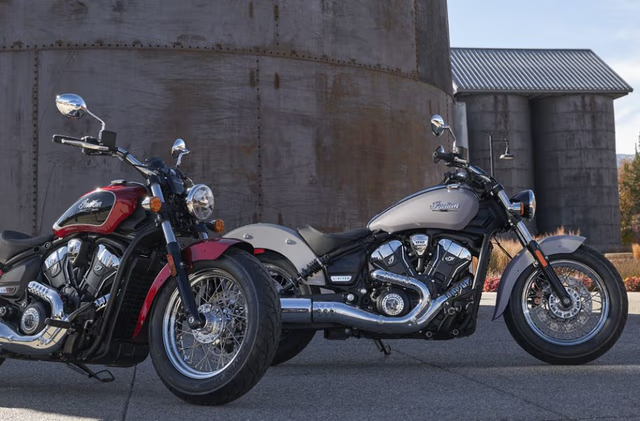 car&bike Team | Feb 11, 2026Indian Motorcycle Won’t Build Entry-Level Bike, Says New CEOThe brand’s new CEO Mike Kennedy has all but denied any plans of Indian Motorcycle looking at entry-level bikes in the foreseeable future.1 min read
car&bike Team | Feb 11, 2026Indian Motorcycle Won’t Build Entry-Level Bike, Says New CEOThe brand’s new CEO Mike Kennedy has all but denied any plans of Indian Motorcycle looking at entry-level bikes in the foreseeable future.1 min read car&bike Team | Feb 11, 2026TVS Gives iQube Electric Scooter To Vatican City State For Daily OperationsAiming to promote zero-emission mobility, the e-scooters are expected to help with the daily operational needs of the Vatican.1 min read
car&bike Team | Feb 11, 2026TVS Gives iQube Electric Scooter To Vatican City State For Daily OperationsAiming to promote zero-emission mobility, the e-scooters are expected to help with the daily operational needs of the Vatican.1 min read
 Bilal Firfiray | Feb 12, 2026BMW X3 30 xDrive M Sport Review: The Driver’s SUV ReturnsRange-toppingX3 30 xDrive M Sport brings back the fun with 255bhp and genuine enthusiast appeal. Does this performance-focused SUV stand out?5 mins read
Bilal Firfiray | Feb 12, 2026BMW X3 30 xDrive M Sport Review: The Driver’s SUV ReturnsRange-toppingX3 30 xDrive M Sport brings back the fun with 255bhp and genuine enthusiast appeal. Does this performance-focused SUV stand out?5 mins read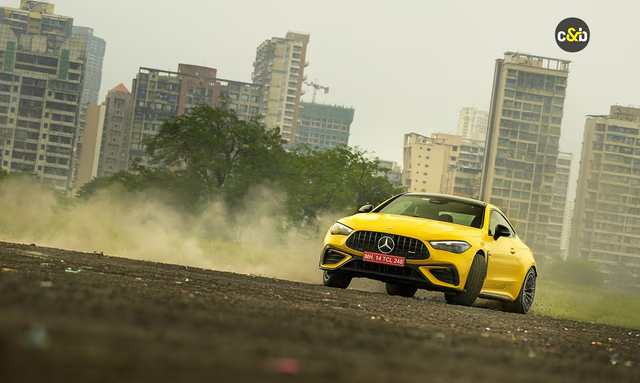 Bilal Firfiray | Feb 11, 2026Mercedes-AMG CLE 53 Coupe Review: The Goldilocks AMG?The Mercedes-AMG CLE 53 Coupe is a concoction of hooliganistic performance and everyday usability. Here’s why this Rs 1.5 crore two-door AMG might be the perfect modern sports coupe for India.6 mins read
Bilal Firfiray | Feb 11, 2026Mercedes-AMG CLE 53 Coupe Review: The Goldilocks AMG?The Mercedes-AMG CLE 53 Coupe is a concoction of hooliganistic performance and everyday usability. Here’s why this Rs 1.5 crore two-door AMG might be the perfect modern sports coupe for India.6 mins read Girish Karkera | Feb 11, 2026Toyota Ebella EV Review: Compact And Fun-To-Drive With The Promise Of Stress-Free AftersalesNo hiding the fact that it is a clone of the Maruti Suzuki eVitara, but the first all-electric Toyota in India is reasonably well-rounded8 mins read
Girish Karkera | Feb 11, 2026Toyota Ebella EV Review: Compact And Fun-To-Drive With The Promise Of Stress-Free AftersalesNo hiding the fact that it is a clone of the Maruti Suzuki eVitara, but the first all-electric Toyota in India is reasonably well-rounded8 mins read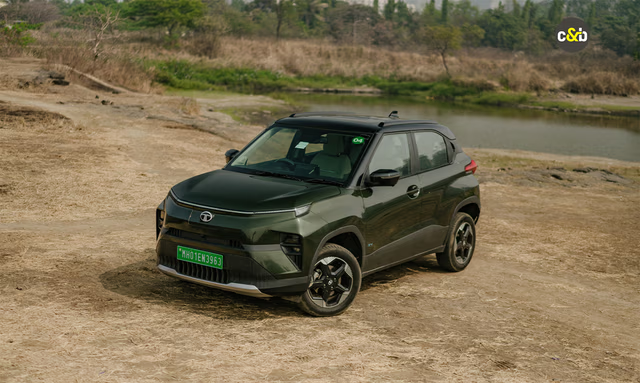 Bilal Firfiray | Feb 10, 2026Tata Punch EV Long Term Review: Small EV With A Big-Hearted PersonalityWith the new Punch EV Facelift just around the corner, we decided to take a look at what it excels at and what could be improved.7 mins read
Bilal Firfiray | Feb 10, 2026Tata Punch EV Long Term Review: Small EV With A Big-Hearted PersonalityWith the new Punch EV Facelift just around the corner, we decided to take a look at what it excels at and what could be improved.7 mins read Bilal Firfiray | Feb 4, 2026Volkswagen Tayron R-Line Review: Sensible Flagship For IndiaVolkswagen has introduced a made-in-India flagship SUV that offers space, comfort, performance, and German driving finesse in a practical three-row package. But is the Tayron R-Line good enough?6 mins read
Bilal Firfiray | Feb 4, 2026Volkswagen Tayron R-Line Review: Sensible Flagship For IndiaVolkswagen has introduced a made-in-India flagship SUV that offers space, comfort, performance, and German driving finesse in a practical three-row package. But is the Tayron R-Line good enough?6 mins read



